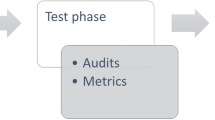Abstract
Ethics and ethical information processing are an important problem for AI development. It is important for self-evident reasons, but also challenging in its’ implications and should be welcomed by designers and developers as an interesting technical challenge. This article explores AI ethics as a design problem and lays out how cognitive mimetics could be used a method for its design. AI ethics is conceptualized as a problem of implementation on the one hand, and as a problem of ethical contents on the other. From the viewpoint of human information processing, ethics becomes a special case of ethical information processing - one that has deep implications in terms of AI abilities and information contents. Here we focus on ethical information processing as a property of the system (rather as a general constraint on it). We explore three specific concepts relevant for cognitive mimetics from the perspective of ethics: tacit knowledge, ontologies, and problem restructuring. We close with a general discussion on the difference between abilities and mental contents noted as relevant in previous articles on cognitive mimetics and reiterate its importance in this context as well.
Access this chapter
Tax calculation will be finalised at checkout
Purchases are for personal use only
Similar content being viewed by others
References
The IEEE Global Initiative on Ethics of Autonomous and Intelligent Systems. Ethically Aligned Design: A Vision for Prioritizing Human Well-being with Autonomous and Intelligent Systems, 1st edn. IEEE (2019)
Kujala, T., Saariluoma, P.: Cognitive mimetics for designing intelligent technologies. Adv. Hum. Comput. Interact. (2018)
Saariluoma, P., Kujala, T., Karvonen, A., Ahonen, M.: Cognitive mimetics - main ideas. In: Proceedings on the International Conference on Artificial Intelligence (ICAI), pp. 202–206. The Steering Committee of the World Congress in Computer Science, Computer Engineering and Applied Computing (WorldComp) (2018)
Saariluoma, P., Karvonen, A., Wahlstrom, M., Happonen, K., Puustinen, R., Kujala, T.: Challenge of tacit knowledge in acquiring information in cognitive mimetics. In: Karwowski, W., Ahram, T. (eds.) IHSI 2019. AISC, vol. 903, pp. 228–233. Springer, Cham (2019). https://doi.org/10.1007/978-3-030-11051-2_35
Saariluoma, P., Wahlström, M., Kujala, T., Puustinen, R., Karvonen, A., Happonen, K.: An ontology for cognitive mimetics. In: 2018 International Conference on Computational Science and Computational Intelligence (CSCI), pp. 1188–1192. IEEE (2018)
Karvonen, A., Kujala, T., Saariluoma, P.: Types of mimetics for the design of intelligent technologies. In: Ahram, T., Karwowski, W., Pickl, S., Taiar, R. (eds.) IHSED 2019. AISC, vol. 1026, pp. 40–46. Springer, Cham (2020). https://doi.org/10.1007/978-3-030-27928-8_7
Alexander, C.: Notes on the Synthesis of Form, vol. 5. Harvard University Press, Cambridge (1964)
Friedman, B., Kahn Jr., P.H.: Human values, ethics, and design. In: The Human-Computer Interaction Handbook, pp. 1209–1233. CRC Press (2002)
Friedman, B.: Value-sensitive design. Interactions 3(6), 16–23 (1996)
Friedman, B., Kahn, P.H., Borning, A., Huldtgren, A.: Value sensitive design and information systems. In: Doorn, N., Schuurbiers, D., van de Poel, I., Gorman, Michael E. (eds.) Early engagement and new technologies: opening up the laboratory. PET, vol. 16, pp. 55–95. Springer, Dordrecht (2013). https://doi.org/10.1007/978-94-007-7844-3_4
Albrechtslund, A.: Ethics and technology design. Ethics Inf. Technol. 9(1), 63–72 (2007)
Borning, A., Muller, M.: Next steps for value sensitive design. In: Proceedings of the SIGCHI Conference on Human Factors in Computing Systems, pp. 1125–1134. ACM (2012)
Poel, I.: Translating values into design requirements. In: Michelfelder, D.P., McCarthy, N., Goldberg, D.E. (eds.) Philosophy and Engineering: Reflections on Practice, Principles and Process. PET, vol. 15, pp. 253–266. Springer, Dordrecht (2013). https://doi.org/10.1007/978-94-007-7762-0_20
Van Wynsberghe, A., Robbins, S.: Ethicist as designer: a pragmatic approach to ethics in the lab. Sci. Eng. Ethics 20(4), 947–961 (2014)
Umbrello, S.: Beneficial artificial intelligence coordination by means of a value sensitive design approach. Big Data and Cognitive Computing 3(1), 5 (2019)
Wallach, W., Allen, C.: Moral Machines: Teaching Robots Right from Wrong. Oxford University Press, New York (2008)
Anderson, M., Anderson, S.L.: Machine Ethics. Cambridge University Press, New York (2011)
McLaren, B.M.: Computational models of ethical reasoning: challenges, initial steps, and future directions. IEEE Intell. Syst. 21(4), 29–37 (2006)
Lake, B.M., Ullman, T.D., Tenenbaum, J.B., Gershman, S.J.: Building machines that learn and think like people. Behav. Brain Sci. 40 (2017)
Woollard, F., Howard-Snyder, F.: Doing vs. allowing harm. In: Zalta, E.N. (ed.) The Stanford Encyclopedia of Philosophy. https://plato.stanford.edu/archives/win2016/entries/doing-allowing/. Winter 2016 Edition
Newell, A., Simon, H.A.: Human Problem Solving, vol. 104, no. 9. Prentice-hall, Englewood Cliffs (1972)
Floridi, L.: The logic of design as a conceptual logic of information. Mind. Mach. 27(3), 495–519 (2017)
Howells, J.: Tacit knowledge. Technol. Anal. Strat. Manag. 8(2), 91–106 (1996)
Dennett, D.C.: Cognitive wheels: the frame problem of AI. In: Boden, M.A. (ed.) The Philosophy of Artificial Intelligence, pp. 147–170. Oxford University Press, New York (1990)
Chandrasekaran, B., Josephson, J.R., Benjamins, V.R.: What are ontologies, and why do we need them? IEEE Intell. Syst. Appl. 14(1), 20–26 (1999)
Ohlsson, S.: The problems with problem solving: Reflections on the rise, current status, and possible future of a cognitive research paradigm. J. Probl. Solv. 5(1), 7 (2012)
Saariluoma, P., Rauterberg, M.: Turing test does not work in theory but in practice. In: Proceedings on the International Conference on Artificial Intelligence (ICAI), p. 433. The Steering Committee of The World Congress in Computer Science, Computer Engineering and Applied Computing (WorldComp) (2015)
Saariluoma, P., Rauterberg, M.: Turing’s error-revised. Int. J. Philos. Study 4 (2016)
Acknowledgements
This work is funded by the Finnish Academy through the ETAIROS (https://etairos.fi/en/front-page/) project.
Author information
Authors and Affiliations
Corresponding author
Editor information
Editors and Affiliations
Rights and permissions
Copyright information
© 2020 Springer Nature Switzerland AG
About this paper
Cite this paper
Karvonen, A. (2020). Cognitive Mimetics for AI Ethics: Tacit Knowledge, Action Ontologies and Problem Restructuring. In: Rauterberg, M. (eds) Culture and Computing. HCII 2020. Lecture Notes in Computer Science(), vol 12215. Springer, Cham. https://doi.org/10.1007/978-3-030-50267-6_8
Download citation
DOI: https://doi.org/10.1007/978-3-030-50267-6_8
Published:
Publisher Name: Springer, Cham
Print ISBN: 978-3-030-50266-9
Online ISBN: 978-3-030-50267-6
eBook Packages: Computer ScienceComputer Science (R0)




